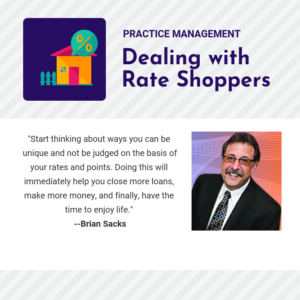TRENDING WHITEPAPERS,VIDEOS & MORE
A Primer for How Not to Deal with Rate Shoppers
- Sunday, 14 April 2019
- Originating

One of the things we all wonder about as originators is how to compete with on-line and other lenders who simply buy the market.
There are a number of strategies for dealing with this like positioning yourself as the obvious go to celebrity originator in your market.
But one of the best ways to approach rate shoppers is to not deal with them at all.
Huh? Yes, you read that correctly. If you know that your rates are never going to beat on-line lenders, stop competing with them.
You can do that by executing the following strategy:
- Pick a niche.
- Become the expert.
- Let everyone know about it.
To put it more simply: Work with buyers who can’t shop. There are two major groups of buyers who simply can’t shop rates and points because they don’t qualify. There is also a third group of buyers who generally won’t shop because they are under a time constraint and will follow the guidance of their attorneys.
[adbutler zone_id="326324"]
[adbutler zone_id="326327"]
The first two groups are buyers who have income or credit challenges. There are a number of non-quality mortgage programs now available to these buyers who don’t fit Federal Housing Authority, Veterans Affairs or Fannie Mae guidelines.
They want a loan and realize they don’t qualify with standard programs.
There are now programs for buyers with very low scores. Buyers who have had a bankruptcy, foreclosure or short sale. There are also programs for buyers who are self-employed or work on commission and have large write offs.
Here’s the formula: Learn these programs by meeting with your non-quality mortgage representatives. Let everyone know about your expertise by writing about it and teaching agents and builders about these programs. Go to the media because these programs are a great story that will get you exposure on TV, radio and print publications. You could even place ads for these buyers online and off line.
The third group of buyers who don’t shop: This group of buyers are those that are referred to you by one of their trusted advisors, such as an accountant, attorney, or financial planner. One of the best groups of clients, I have found, are those going through a divorce.
Generally, when a client is going through a divorce, there is often a home involved and one of the spouses will be leaving the home. The spouse leaving the home may want to buy, while the spouse remaining in the home may be legally obligated to refinance and get the other spouse off the mortgage and deed.
These buyers can be referred to you by their attorneys and their agreements often call for the refinance to be done within a certain time frame.
Start thinking about ways you can be unique and not be judged on the basis of your rates and points. Doing this will immediately help you close more loans, make more money, and finally, have the time to enjoy life.
About the Author: Brian Sacks is a branch manager and originator with Homebridge Financial in Baltimore, Md. Also, he is the founder of TopOriginatorSecrets.com and the author of the best-selling success manual for originators “48 Proven Ways to Immediately Close More Loans”
Read more...
Guess What, There’s No Silver Bullet
- Thursday, 11 April 2019
- Originating


While at the New Jersey Mortgage Bankers Associations show today in Atlantic City, Genworth’s Steve Richman was discussing ways for lenders to drive more business. “Customers do business with you for a number of reasons. They do business with you because of your corporate brand, they do business with you because of your personal brand relationship, because of your price, because of other services that you offer or because of your expertise. There is no single “sliver bullet” that lenders can concentrate on to drive business.
Perhaps the best way to help drive business, according to Richman, is to differentiate yourself.
“If your all about rates you’re a one-trick pony. And some people want a one trick pony. But if you want to be in the business for the long term you can’t put yourself in a position to be out of business once someone comes along and beats your one trick,” said Richman.
One way to differentiate is to diversify by offering a more comprehensive, meaningful product offering, such as the following:
- Find partners and programs that help you. Genworth’s Home Suite Home program, which was introduced about a month ago, allows lenders to offer identity-theft protection, a warranty on your home appliances or a rebate on your homeowners insurance. This helps consumers make a purchasing decision based on more than price.
- The four expectations that customers want from an originator is they want their mortgage fast, and they want to work with someone who is easy to work with. Everyone wants their originator not to make mistakes and to be reasonably priced. All of these can be used to differentiate if you use numbers. There is a big difference in saying, “We help a lot of first-time home buyers” compared with ”98% of all first-time home buyers I saw last year we approved for a loan.” Originators have to be able to measure their performance.
- Leverage technology to help address your customer’s needs. For example, rather than giving a house warming present, offer to set up your clients Alexa system for the new house. Alexa has over 70,000 skills on it. Alexa can order pizza, play music, start their car or turn on their house lights if they can’t make it home.
Another way to leverage technology is to show clients different applications that help them address their needs, such as the following:
- AroundMe App: Shows your clients what’s in the neighborhood
- NameShark: Helps you remember names
- Memorize Anything: Learn things by hearing them over and over
- Magic Plan: Use your camera to capture the dimensions of a room
- Paint Tester: Take a picture of a paint sample and it will show you what the room will look like in that color.
- Wayfair: Good prices on things for the home.
“All of these measures are best done taking a customer-centric approach. Let the consumer know the good decisions they have made, don’t try to sell them," Richman. "For example, a lot of people say, “Home values just went up 5% so if you sell today look how much you can make.” That’s the wrong approach. It’s better to say, “home values just went up 5%, you were smart to buy this home in this neighborhood. You just made it about your customer, not about you.”
Read more...
NewRez Live with New Product, Pricing Engine
- Thursday, 04 April 2019
- Originating

 National mortgage lender NewRez has gone live with LoanNEX, providing lenders expanded access to the lender’s non-quality mortgage and other products.
National mortgage lender NewRez has gone live with LoanNEX, providing lenders expanded access to the lender’s non-quality mortgage and other products.
With the addition of the LoanNEX platform, a pricing and eligibility engine, NewRez lenders are able to quickly and confidently find a fit across NewRez’s non-QM loan programs and serve more borrowers who don’t qualify for agency programs.
“The LoanNEX non-QM product and pricing platform will allow lenders to access NewRez pricing and product eligibility,” Lisa Schreiber, senior vice president of correspondent lending at NewRez. “It provides for national exposure and a transparent, competitive process with other non-QM buyers.”
[adbutler zone_id="326324"]
[adbutler zone_id="326327"]
Non-QM origination volume increased to $380 million in the fourth quarter of 2018, from $20 million in the first quarter of 2018. NewRez, formerly New Penn, is a subsidiary of New Residential Investment Corp.
As reported in The Mortgage Leader earlier this year, the volume of originations NewRez has targeted for 2019 is around $15 billion, double the $7.2 billion in originations the company completed in 2018, Michael Nierenberg, CEO of New Residential Investment Corp., said during the company’s most recent quarterly earnings call. New Residential is the parent company of NewRez.
“In today’s changing market, we know how important it is for lenders to differentiate themselves and bring real solutions to their borrowers,” says LoanNEX’s CEO and co-founder, Eloise Schmitz. “This requires having access to both the right products and the right tools to deliver the best options to your borrowers."
Read more...
Heard Around the Industry: Arch MI Updates RateStar
- Wednesday, 03 April 2019
- Originating

Arch Mortgage Insurance Company has updated their premium pricing tool, RateStar, to provide express quotes and customized pricing options through a portal. RateStar was launched 10-years ago as a tool that could evaluate individual loan risk with more precision than any rate sheet.
RateStar offers a mortgage insurance buydown feature, and its buydown feature allows loan officers to customize a mortgage insurance premium payment for each borrower. The portal is available on through most loan origination systems and pricing engines, as well as through Arch MI’s origination platform, CONNECT, and its downloadable mobile app.
[adbutler zone_id="326324"]
[adbutler zone_id="326327"]
“RateStar continues to evolve as we apply our decade of expertise and customer feedback,” said Michael Schmeiser, Arch MI’s President and CEO. “RateStar offers an express rate quote option that returns rate quotes faster and requires far fewer fields. Users have a full range of MI pricing options to choose from. RateStar provides a streamlined, uncluttered customer experience with design enhancements based on lender preferences.”
Calyx Enhances Technology
Calyx Software has enhanced Zip, a point-of-sale platform, to provide larger organizations with greater control and transparency over individual user profiles.
With this update, banks, credit unions, and non-bank lenders can designate a chief administrator, who has complete control to oversee, manage and standardize all of the company’s individual user accounts with ease. He can standardize the content on each of their Zip user websites to ensure consistency and compliance with company policies. In addition, the administrator can oversee activity and billing from all users, generate a single billing report, and set up ACH payment.
Read more...




